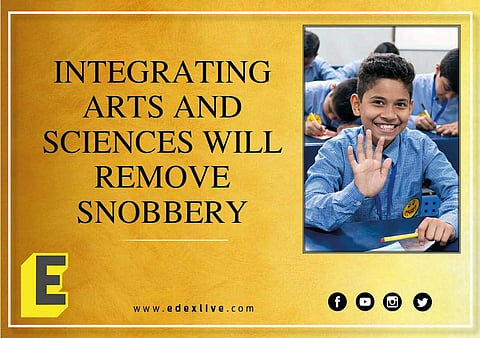

One of the key takeaways from the new National Education Policy, the details of which was announced on July 29 by Higher Education Secretary Amit Khare, is the increased focus on Arts and the proposed integration of Arts and Sciences. According to the policy document, there is to be no hard separation between the streams and also between sports, cultural and vocational crafts. Equal focus will also be given to academics and co-curricular activities. This holistic approach is aimed to ensure the students' overall development where they not only learn what's in their syllabus but also learn essential life skills.
This move has been welcomed from across several quarters. Commending the new NEP, Fr Prashanth, Principal of Sacred Heart College, Kochi, said, "The focus of the policy has been to make education more integrated since now there is a tendency of excessive specialisation without any desired effect. The idea that the students are exposed to a holistic picture is good. But I'm unsure how it has been construed and how it will be combined. The teachers should be given enough clarity and should be educated enough to handle this change. Students will have greater choices, which is not the case right now. This also seems to replicate how Western education functions. Every human activity will be considered an art - whether it is science and technology. This is the liberal way of looking at arts."
Principal of KIIT World School, Gurugram, Dr Neelima Kamrah said that the NEP is trying to create a "flexible, multidisciplinary, interdisciplinary and trans-disciplinary approach in the curriculum to provide holistic education for children." In her view, "The lack of separation will ensure the unity and integrity of all knowledge and will eliminate harmful hierarchies among, and silos between different areas of learning. This multidisciplinary approach to education across the sciences, social sciences, arts, humanities and sports will help create well rounded citizens."
Dr Sankar UV, Director of The Sports School, Bangalore, said that this move has been a long time coming and will increase creative temperament among students, "The initiative of putting equal emphasis on Arts and Science subjects is something that was the need of the hour and will help students in exploring their interests with much more enthusiasm and will also give them a chance to actualise their capabilities. This is a step in the right direction as it encourages development of creative and artistic temperaments along with the scientific. While it is too early to comment on whether this leads to actual equality in both streams, it will definitely sow the seeds of the change in the mindset of parents, teachers and students."
On Wednesday, HRD Minister Ramesh Pokhriyal 'Nishank', Information and Broadcasting Minister Prakash Javadekar and Anita Karwal, Secretary in the Department of Education and Literacy, MHRD along with Khare jointly addressed the media to announce the details of the new National Education Policy, the committee for which was headed by former ISRO chief K Kasturirangan. The NEP, approved by the Union Cabinet, at a meeting presided by Prime Minister Narendra Modi, replaces the 34-year-old National Policy on Education framed in 1986.
